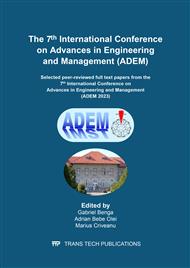[1]
https: //www.eea.europa.eu/en/circularity?activeAccordion=84342fea-fadf-4b34-b78d-911e3 1637cb6
Google Scholar
[2]
https://www.un.org/sustainabledevelopment/development-agenda/UNESCO,Global education monitoring report summary, 2023: technology in education: a tool on whose terms?, https://unesdoc.unesco.org/ark:/48223/pf0000386147?posInSet=1&queryId=N-3ab26d67-cf88-4219-886c-2ebd0bd83885
DOI: 10.54676/qlsh1981
Google Scholar
[3]
http://www.imst.ro/images/stories/Plan_Strategic_IMST_2020-2024.pdf
Google Scholar
[4]
European Commission, Communication from the Commission to the European Parliament, the Council, the European Economic and Social Committee and the Committee of the Regions Towards a circular economy: A zero waste programme for Europe /* COM/2014/0398 final */
DOI: 10.54648/eerr1996017
Google Scholar
[5]
European Commission, European Skills Agenda for Sustainable Competitiveness, Social Fairness and Resilience
Google Scholar
[6]
https://www.aracis.ro/wp-content/uploads/2023/07/10.-Vol-1-Standarde-ARACIS-Comisia-10-si-11-Stiinte-ingineresti-actualiz-in-30.06.2023.pdf
Google Scholar
[7]
https://www.aracis.ro/wp-content/uploads/2023/07/11.-Vol-2-Standarde-ARACIS-Comisia-10-si-11-Stiinte-ingineresti-actualiz-in-30.06.2023.pdf
Google Scholar
[8]
The Government of Romania, The National Strategy on the Circular Economy, Monitorul Oficial al României, No. 943 bis/27.IX.(2022)
Google Scholar
[9]
C Ghermec, O Ghermec, The Potential of the Mehedinţi County to Transform Waste into Resources, Advanced Engineering Forum (34), pp.203-208, (2019)
DOI: 10.4028/www.scientific.net/aef.34.203
Google Scholar
[10]
I.D. Savu, S.V. Savu, Recovery and reuse of austenitic-ferritic stainless steel tanks from a river vessel, Revista SUDURA, 2/(2020)
Google Scholar
[11]
S., Radu, M., Demian, G., Demian, M., Ciobanu M., Studies on the Possibility of Recycling Waste Bronze, Advanced Materials Research, Vol. 1128, pp.303-311, Oct. 2015, http://www.scientific.net/AMR.1128
DOI: 10.4028/www.scientific.net/amr.1128.303
Google Scholar
[12]
M., Ciobanu, I., Bucse, S., Radu, Study on the actual energy potential of renewable sources of energy in Romania, Advanced Engineering Forum, vol. 34, pp.209-214, (2019)
DOI: 10.4028/www.scientific.net/aef.34.209
Google Scholar
[13]
M., Demian, L., Grecu Luminita , G., Demian, Optimizations for materials selection and its importance in a performance management, Advanced Engineering Forum Vol. 27, Trans tech Publications Ltd, pp.257-261, ISSN print 2234-9898 2018.
DOI: 10.4028/www.scientific.net/aef.27.257
Google Scholar
[14]
P, Mako P.,A., David., P., Bohm, S.V., Savu, Sustainable Transport in the Danube Region, Sustainability, 13 (12), (2021)
Google Scholar
[15]
B.-A., Olei, R. I., Iacobici, Logistic and Transportation Challenges in Education, Advanced Engineering Forum (34), 261-266, (2019)
DOI: 10.4028/www.scientific.net/aef.34.261
Google Scholar
[16]
O. Ghermec, C. Ghermec, Integrating the Circular Economy in Forming the Future Naval Engineers, Proceedings of the International Conference of Mechanical Engineering (ICOME-2022), pp.306-312, Atlantis Highlights in Engineering, (2023)
DOI: 10.2991/978-94-6463-152-4_34
Google Scholar
[17]
https: //www.eea.europa.eu/en/circularity?activeAccordion=84342fea-fadf-4b34-b78d-911e 31637cb6
Google Scholar


